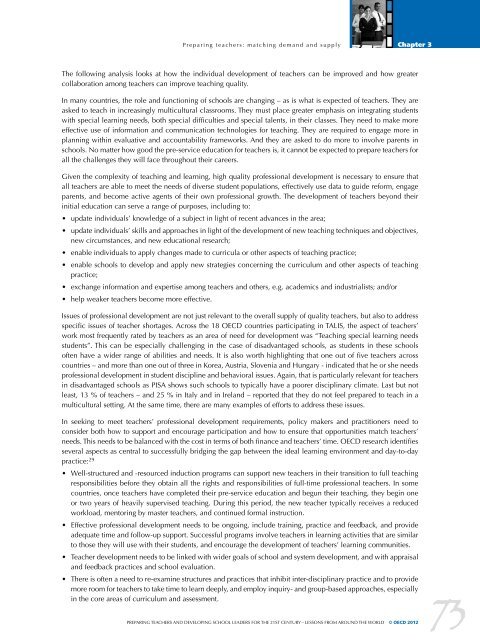Preparing Teachers and Developing School Leaders for the 21st Century
Preparing Teachers and Developing School Leaders for the 21st Century
Preparing Teachers and Developing School Leaders for the 21st Century
Create successful ePaper yourself
Turn your PDF publications into a flip-book with our unique Google optimized e-Paper software.
<strong>Preparing</strong> teachers: matching dem<strong>and</strong> <strong>and</strong> supply<br />
Chapter 3<br />
<strong>the</strong> following analysis looks at how <strong>the</strong> individual development of teachers can be improved <strong>and</strong> how greater<br />
collaboration among teachers can improve teaching quality.<br />
in many countries, <strong>the</strong> role <strong>and</strong> functioning of schools are changing – as is what is expected of teachers. <strong>the</strong>y are<br />
asked to teach in increasingly multicultural classrooms. <strong>the</strong>y must place greater emphasis on integrating students<br />
with special learning needs, both special difficulties <strong>and</strong> special talents, in <strong>the</strong>ir classes. <strong>the</strong>y need to make more<br />
effective use of in<strong>for</strong>mation <strong>and</strong> communication technologies <strong>for</strong> teaching. <strong>the</strong>y are required to engage more in<br />
planning within evaluative <strong>and</strong> accountability frameworks. <strong>and</strong> <strong>the</strong>y are asked to do more to involve parents in<br />
schools. no matter how good <strong>the</strong> pre-service education <strong>for</strong> teachers is, it cannot be expected to prepare teachers <strong>for</strong><br />
all <strong>the</strong> challenges <strong>the</strong>y will face throughout <strong>the</strong>ir careers.<br />
given <strong>the</strong> complexity of teaching <strong>and</strong> learning, high quality professional development is necessary to ensure that<br />
all teachers are able to meet <strong>the</strong> needs of diverse student populations, effectively use data to guide re<strong>for</strong>m, engage<br />
parents, <strong>and</strong> become active agents of <strong>the</strong>ir own professional growth. <strong>the</strong> development of teachers beyond <strong>the</strong>ir<br />
initial education can serve a range of purposes, including to:<br />
• update individuals’ knowledge of a subject in light of recent advances in <strong>the</strong> area;<br />
• update individuals’ skills <strong>and</strong> approaches in light of <strong>the</strong> development of new teaching techniques <strong>and</strong> objectives,<br />
new circumstances, <strong>and</strong> new educational research;<br />
• enable individuals to apply changes made to curricula or o<strong>the</strong>r aspects of teaching practice;<br />
• enable schools to develop <strong>and</strong> apply new strategies concerning <strong>the</strong> curriculum <strong>and</strong> o<strong>the</strong>r aspects of teaching<br />
practice;<br />
• exchange in<strong>for</strong>mation <strong>and</strong> expertise among teachers <strong>and</strong> o<strong>the</strong>rs, e.g. academics <strong>and</strong> industrialists; <strong>and</strong>/or<br />
• help weaker teachers become more effective.<br />
issues of professional development are not just relevant to <strong>the</strong> overall supply of quality teachers, but also to address<br />
specific issues of teacher shortages. Across <strong>the</strong> 18 OECD countries participating in TALIS, <strong>the</strong> aspect of teachers’<br />
work most frequently rated by teachers as an area of need <strong>for</strong> development was “teaching special learning needs<br />
students”. this can be especially challenging in <strong>the</strong> case of disadvantaged schools, as students in <strong>the</strong>se schools<br />
often have a wider range of abilities <strong>and</strong> needs. it is also worth highlighting that one out of five teachers across<br />
countries – <strong>and</strong> more than one out of three in Korea, austria, slovenia <strong>and</strong> hungary - indicated that he or she needs<br />
professional development in student discipline <strong>and</strong> behavioral issues. again, that is particularly relevant <strong>for</strong> teachers<br />
in disadvantaged schools as Pisa shows such schools to typically have a poorer disciplinary climate. last but not<br />
least, 13 % of teachers – <strong>and</strong> 25 % in italy <strong>and</strong> in irel<strong>and</strong> – reported that <strong>the</strong>y do not feel prepared to teach in a<br />
multicultural setting. at <strong>the</strong> same time, <strong>the</strong>re are many examples of ef<strong>for</strong>ts to address <strong>the</strong>se issues.<br />
In seeking to meet teachers’ professional development requirements, policy makers <strong>and</strong> practitioners need to<br />
consider both how to support <strong>and</strong> encourage participation <strong>and</strong> how to ensure that opportunities match teachers’<br />
needs. This needs to be balanced with <strong>the</strong> cost in terms of both finance <strong>and</strong> teachers’ time. OECD research identifies<br />
several aspects as central to successfully bridging <strong>the</strong> gap between <strong>the</strong> ideal learning environment <strong>and</strong> day-to-day<br />
practice: 29<br />
• Well-structured <strong>and</strong> -resourced induction programs can support new teachers in <strong>the</strong>ir transition to full teaching<br />
responsibilities be<strong>for</strong>e <strong>the</strong>y obtain all <strong>the</strong> rights <strong>and</strong> responsibilities of full-time professional teachers. in some<br />
countries, once teachers have completed <strong>the</strong>ir pre-service education <strong>and</strong> begun <strong>the</strong>ir teaching, <strong>the</strong>y begin one<br />
or two years of heavily supervised teaching. during this period, <strong>the</strong> new teacher typically receives a reduced<br />
workload, mentoring by master teachers, <strong>and</strong> continued <strong>for</strong>mal instruction.<br />
• effective professional development needs to be ongoing, include training, practice <strong>and</strong> feedback, <strong>and</strong> provide<br />
adequate time <strong>and</strong> follow-up support. successful programs involve teachers in learning activities that are similar<br />
to those <strong>the</strong>y will use with <strong>the</strong>ir students, <strong>and</strong> encourage <strong>the</strong> development of teachers’ learning communities.<br />
• teacher development needs to be linked with wider goals of school <strong>and</strong> system development, <strong>and</strong> with appraisal<br />
<strong>and</strong> feedback practices <strong>and</strong> school evaluation.<br />
• <strong>the</strong>re is often a need to re-examine structures <strong>and</strong> practices that inhibit inter-disciplinary practice <strong>and</strong> to provide<br />
more room <strong>for</strong> teachers to take time to learn deeply, <strong>and</strong> employ inquiry- <strong>and</strong> group-based approaches, especially<br />
in <strong>the</strong> core areas of curriculum <strong>and</strong> assessment.<br />
PreParing teachers <strong>and</strong> develoPing school leaders <strong>for</strong> <strong>the</strong> <strong>21st</strong> century – lessons froM around <strong>the</strong> World © OECD 2012<br />
73


